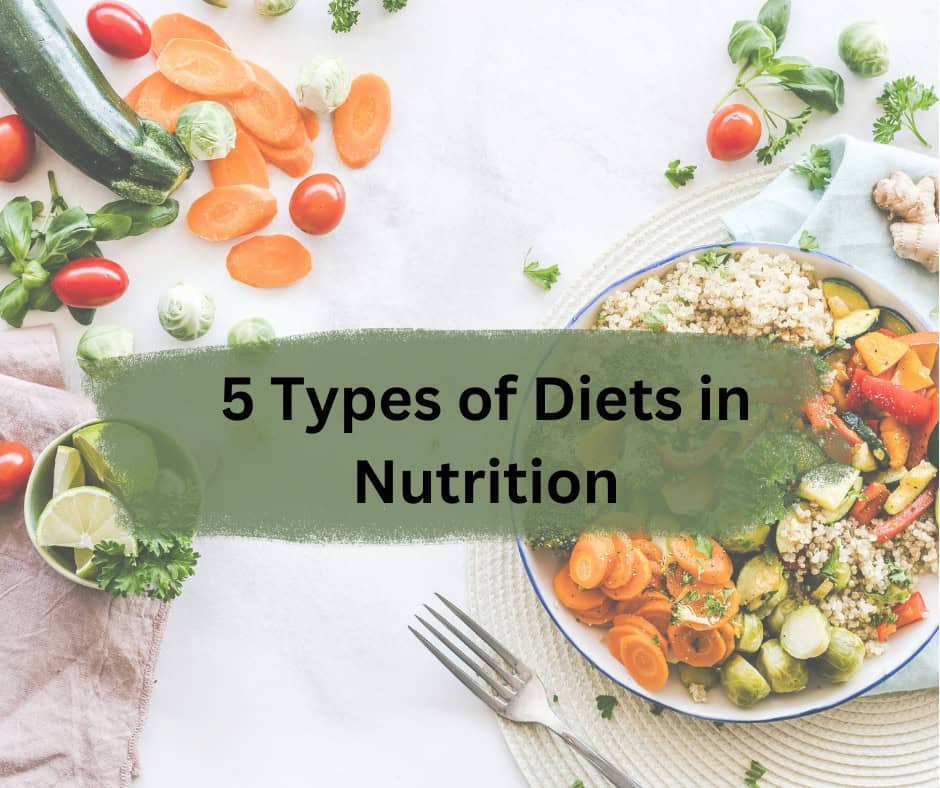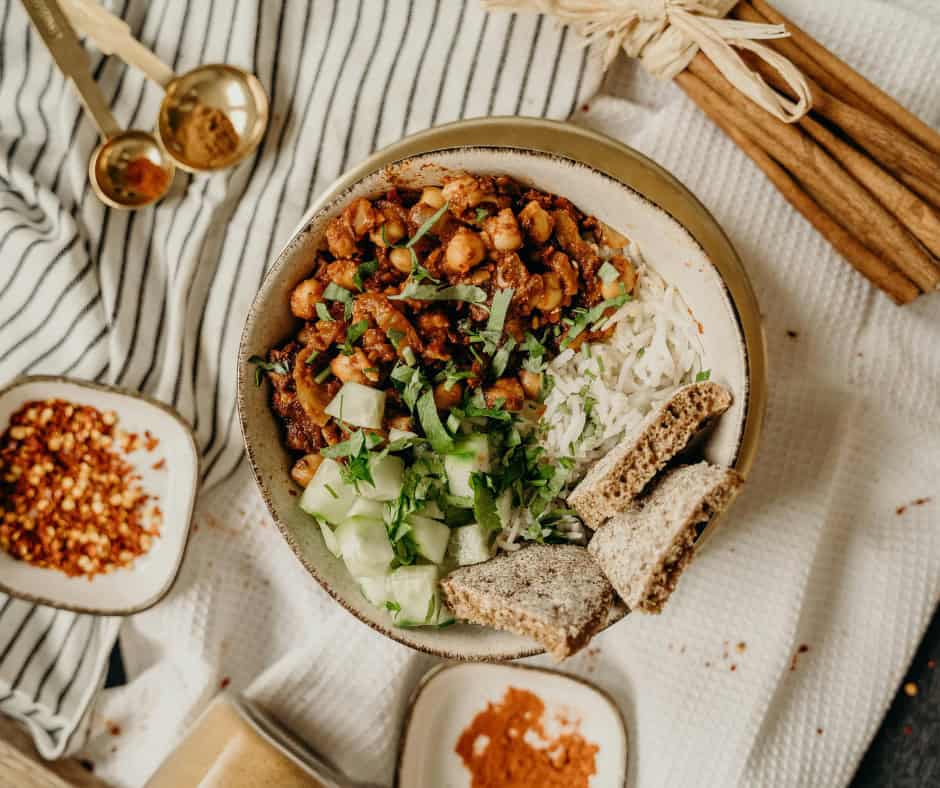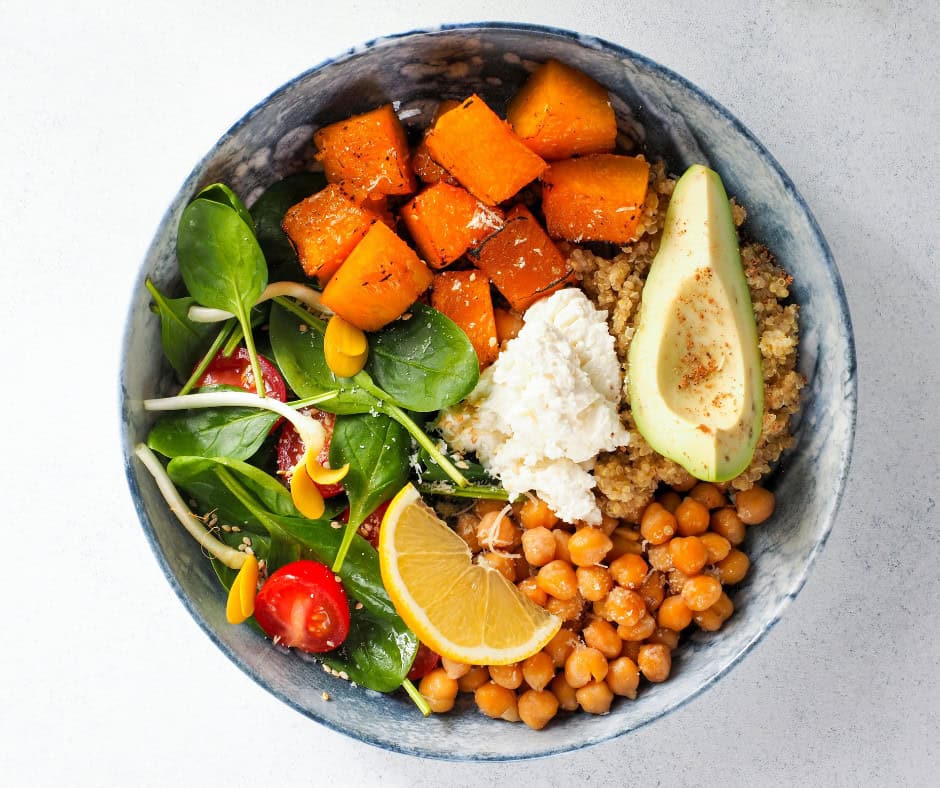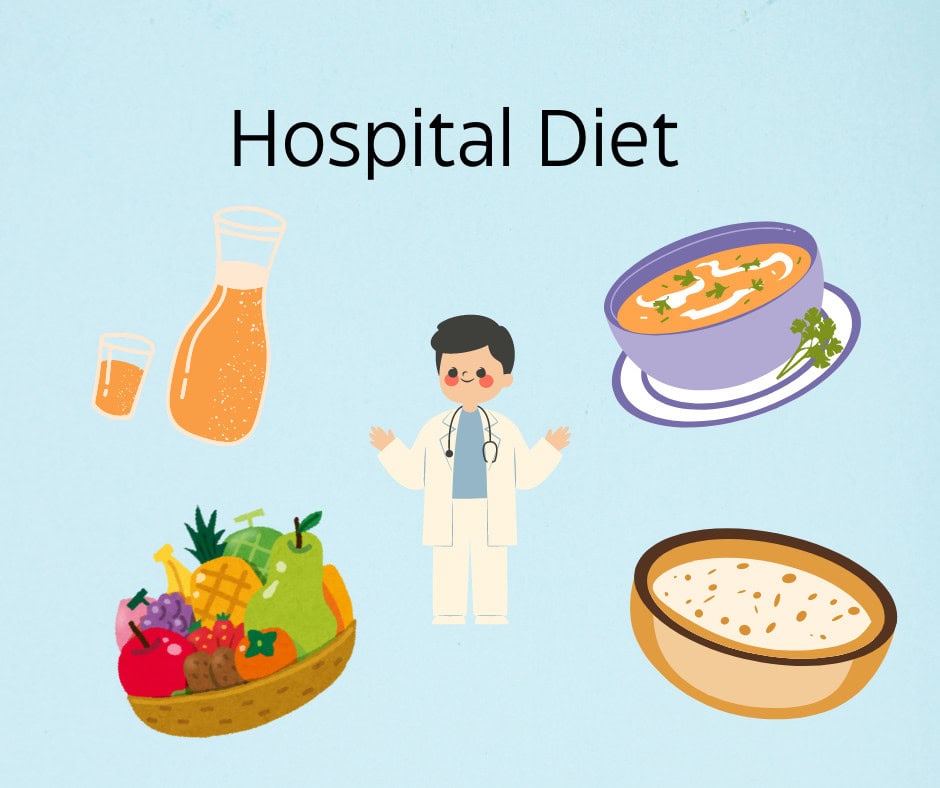These 5 Types of Diets in Nutrition can be used in your daily diet routine and is very beneficial for your weight loss! (Well not the Hospital diet)
In today’s world, dieting has become a significant aspect of people’s lives. Whether it’s to stay fit or due to an underlying health condition, many individuals are following a diet. During my time interning as a dietitian, I noticed that many people don’t fully comprehend the concept of ‘diet’ or ‘dieting.’ Some of them reacted negatively, assuming that I would simply tell them to eat raw vegetables.
So inorder to know about these 5 types of Diets in nutrition, One should understand the basic concept of what Diet or Dieting is…
What is a diet or healthy diet ?
A Healthy diet is one that keeps everyone out of malnutrition, non communicable diseases including diabetes and cardiovascular disease. So when one is following a diet he/she should keep in mind that you should be eating enough to prevent you from the above mentioned conditions and not eat less.. Because if you are eating something less (cut down too much on the portion size) means you are ‘starving’ and not dieting.
In simple words, diet or dieting is not cutting food but simply replacing your junk food to nutrient dense or healthy food. Healthy food doesnt have to mean only salads or fruits, you will have to consume them in the right way and still make it tasty! eg. while making vegetable kurma don’t use oil way too much and cut completely on the full fat cream. Now when a you do this, you are eating veggies which are tasty and will not cause you harm!
While a person is on a diet, he/she should keep in mind to choose food or food groups beneficial to keep them healthy and not cut out on the portion size!

The 5 Types of Diets in Nutrition are: –
These are random 5 types of Diets in Nutrition out of which 4 can be followed! (I would suggest to consult your dietitian for making these diets more delicious for you!)
- Vegan Diet
- Mediterranian Diet
- Dukan Diet
- Intermittant Fasting
- Hospital Diet
5 Types of Diets In Nutrition – Importance of A Diet
Table of Contents
After knowing about the 5 Types of Diets In Nutrition, I would like to draw your attention to the importance of following a diet or rather a balanced diet.
As I mentioned earlier, while you diet, you must keep it balanced so that there is no malnutrition or any kind of disease. When one does that, it helps to achieve right amount of energy and body functions are not dismantled. A daily diet should contain protein, carbohydrates, fats, vitamins and minerals. If you skip any one of them, it can lead to a simple malnutrition like an iron deficiency. For doing this you dont need to just eat raw vegetables or just fruits, because if you do that then you are limiting your body from the other nutrients.
And for this exact reason everone should be mindful of what and how much you eat. Over eating can also cause imbalance in your body leading to diseases and disorders. Now if everyone follows a healthy diet with a good balance of proteins, carbohydrates, fats, vitamins and minerals and follows it up with a good workout routine, you can easily enjoy the ‘junk food” once in a while and not think about the possible health problems.
5 Types of Diets In Nutrition – Explained
Vegan Diet

Vegan diet has become quite popular and is being followed by people all over the world. The main theory of vegan diet is that they use plant based foods like vegetables, fruits, legumes, grains, pulses and is devoid of animal and animal based foods.
Research says that Vegan diet has various health benefits. It has been proven to help in dealing with chronic illness like type 2 diabetes, cardiovascular diseases, obesity and certain types of cancer.
Vegan diets are usually high in dietary fiber, magnesium, folic acid, vitamin E, C , iron and phytochemicals. But are lower in cholesterol, saturated fats, omega 3 , vitamin D, calcium, zinc and vitamin B12.
So a person opting for vegan diet should be on supplementation as they are low in good fats like omega 3. Research shows that people on vegan diet have relatively low vitamin D levels as for vegans it depends upon sun exposure and fortified-vitamin D food. Now people who live in the lesser sun-exopsed area or don’t get fortified-vitamin D foods supplementation is a must.
Note: Supplementation should be prescribed by your dietitian or doctor.
Mediterranean Diet

Mediterranean diet focuses mainly on consuming plant foods like vegetables, fruits, legumes, whole grains, pulses like chickpeas, lentils and nuts and seeds but they are moderate on lean protein like fish and chicken and low-fat diary foods. They mainly use olive oil for oils and fat.
The Mediterranean diet also benefits the heart health, reduces risk of obesity, diabetes, high cholesterol and high blood pressure.
In Mediterranean diet, vegetables can be 3-9 servings, fruits 0.5-2 servings, cereals 1-13 servings, and olive oil upto 8 servings. Similar to the vegan diet, this diet is also rich in fiber.
In a meta-analysis, done, it was observed that people consuming mediterranean diet had 13% reduction in the risk of developing type 2 diabetes. Similarly, people who were obese and who followed the diet saw a 0.16 kg reduction in body weight and 10% risk of developing obesity.
Research also shows that there is 29% reduction in risk of developing heart diseases and 13% reduction in risk of stroke.
Out of the 5 types of Diets in Nutrition, I felt Mediterranean diet was the most easiest to follow.
Dukan Diet

Dukan diet is a physician formulated diet which has 4 phases and maintaining the weight for life. They also believe in not calculating calories and eating lean protein, drinking plenty amount of water and walking daily. This is similar to another diet called the atkins diet.
The 4 phases are attack (phase 1), cruise (phase 2), consolidation (phase 3), stabalization (phase 4).
- The attack phase – the person starts the diet and should be eating majorly 68 protein based foods. This phase lasts upto 2-7 days
- The cruise phase – the person reaches their true weight and in this phase they can eat majorly 32 varieties of vegetables. There is a steady weight loss and gradually protein is also added in this phase.
- Consolidation – This is the most important phase of the diet as it prevents weight gain. In this phase, foods like cheese, bread, fruit and starches are introduced which was formally forbidden.
- Stabilization- This phase helps in maintaining the true weight and mainly consolidation phase foods are allowed.
Intermittent Fasting

Intermittent fasting involves fasting during specific time intervals and then consuming food during designated eating windows. This is different from calorie restriction, which involves consuming low-calorie foods without risking malnutrition. Intermittent fasting may involve not eating at all or eating very little.
Out of the 5 types of diets in nutrition, intermittent fasting is the only one that requires fasting. Fasting is a practice observed in many cultures and religions. In a way, we all break our fast every morning and to some extent, we all fast daily. However, what’s important is the quality and quantity of food we consume when breaking our fast and throughout the day.
Common types of intermittent fasting:-
- The 16/8 plan – eating only during 8 hour window and fasting for 16 hours. This type of fasting is also know as time restricted fasting.
- The 5:2 diet – eating 2000-3000 kilojules i.e (478-717 kcals) on any two days of the week and the rest of the days eating normally.
- The Eat-Stop-Eat method – fasting for 24 hours one or two days per week.
Hosptal Diet

Out of the above mentioned 5 types of diets in nutrition, the hospital diet is one such that cannot be followed other than in hospitals.
Hospital diet is carefully curated for the people admitted as per their health conditions. These diets are disease specific and is prescribed by dietitians in the hosptal. Before a patient is given any food, medical reports, physical observations (height, weight, BMI etc) are considered and then the diet is prescribed.
According to the medical condition of a patient, the food is prepared by keeping in check with the viscosity, consistency, the way it is chopped etc.
Types of hospital diets: –
- Regular diet – this is a general diet where all foods are allowed but except very spicy, fatty and gas forming foods.
- Soft diet – this includes usually bland food and food which made to chew easily.
- Liquid diet – There are 2 types in this – a) clear liquid- as the name suggests the liquid is completely clear without any residue (e.g juices without pulp). b) Full liquid- includes liquids that are creamy i.e has residues eg. soup, juices with pulp.
- Tube feedings – according to the severity of the patient, tube feedings are given and their route is decided such nasogastric, nasojejunal, nasoduodinal etc. Tube feedings are given to people who are unable to eat or drink through their normal route i.e mouth.
The purpose of adding this diet in this blog post was to make you aware of the different types of hospital diets! And hey more information won’t hurt ;P
5 Types of Diets In Nutrition – Advantages and Disadvantage
a) The major advantage of a vegan diet is dealing with weight issues. This diet is really good for people dealing with overweight issues. This is majorly because of diet consists of consuming low calorie-low fat and high fibre foods.
b) Chronic conditions like cardiovascular diseases (CVD) which are a increasing problem, vegan diet has been helpful in reducing the risk of this disease. Since the principle of vegan diet is based on low fat foods, this is good for people suffering from cardiovascular issues. A research study done on vegan diets and cardiovascular diseases prove the prevention of CVD. It is also observed that by following vegan diet there is a improvement in reduction in inflammation, blood pressure, total cholesterol, serum glucose, improved endothelial function, reduced risk of blood clots, reduction in body weight etc.
c) Vegan diet also helps in controlling diabetes mellitus as it follows consumption of high fiber foods. Soluble fiber is known to help in maintaining blood glucose levels thereby managing diabetes. This theory is backed up with research.
a) Since its a complete plant based diet, there are high chances of deficiencies like vitaminB12, protein, vitamin D, calcium, omega 3 fatty acids, zinc and iron.
b) Preparing vegan meals can be challenging and time consuming which discourages people in being consistent with the diet.
c) For people who are non-vegetarians, switching to veganism can be very difficult and challenging.
d) While travelling or dining out finding food or restaurants which are vegan based can be difficult and stressful.
2. Mediterranean Diet – Advantages
a) This diet is good for the heart and good for people suffering with diabetes. Since it is packed with antioxidants and monounsaturated fats (MUFA), raising of cholesterol levels is prevented.
b) A good balanced mediiterranean diet and exercise will help in weight loss
c) Chances of defiencies is less when compared to vegan diet.
a) Nutrient dense foods are usually a dent in the pocket but can be manageable for people with a stable income.
b) Since in mediterranean diet wine is allowed for upto 2 glasses a day for men and 1 glass a day for women, people who have other problems like GERD can face problems with this allowance
a) Calories doesn’t need counting and its ok to not weigh the fod before your eat!
b) Weight reduction is seen rapidly and this can motivate people to follow this diet
c) Alcohol is not allowed unlike the mediterranean diet.
a) Some research states that consuming a very high protein diet with very less carbohydrates can lead to kidney issues.
b) This diet is not suitable for people with kidney issues, high cholesterol, or stomach issues.
c) Some protein rich foods are expensive
4. Intermittent Fasting – Advantages
a) Rapid weight loss if done properly with guidance.
b) Reduces the risk of diabetes by lowering your blood glucose levels
c) Improves your sleep by maintainig the body’s Circadian rythm which inturn helps with better digestion.
a) Fasting is not for everyone. If a person suffers from digestion issues, low blood pressure or diabetes, fasting can worsen the condition. When you don’t have the condition and want to prevent from getting it, then opting for intermittent fasting can be acceptable.
b) Dehydration can be a major disadvantage. During the fasting phases, hydration is a must and if not done properly one can face a lot of health issues.
c) If the person doesnt eat during the eating window or eats earlier, it can lead to disruption of the weightloss journey and sometime cause weight gain.
5 Types of Diets In Nutrition – Conclusion
Diet is an integral part of our lives and each and everyone should make an effort to follow a lifestyle that not only helps them to lose weight or maintain weight, it also will help them to lead a healthy life in the long run. These 5 types of diets in nutrition are an idea and motivation to follow a good eating habit so that you can enjoy your life the way you want to! Being healthy should be a top priority in everyone’s life.
Any of these 5 types of diets in nutrition will help you achieve your goal when followed with a good exercise plan and to do so consult a dietitian so that you will be guided better!
Hope you guys enjoyed this write up, for more such write ups click here.
Well I will not be leaving you guys empty handed… click on the PDF below with a FREE workout plan for PCOS peeps!
PDF – click on the pdf
Thank You!
